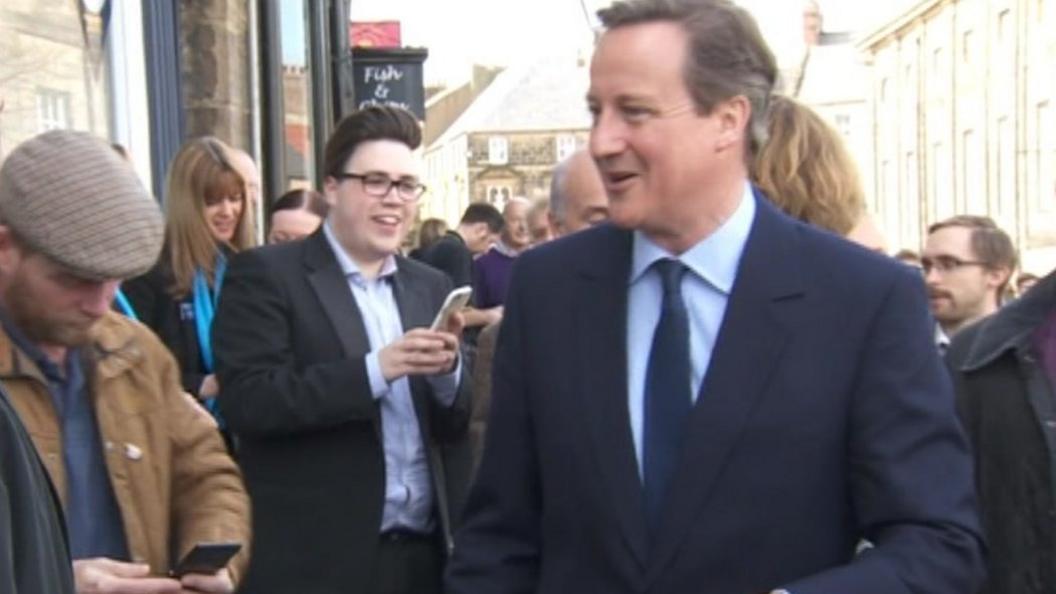Election 2015: The Cameron dilemma
- Published
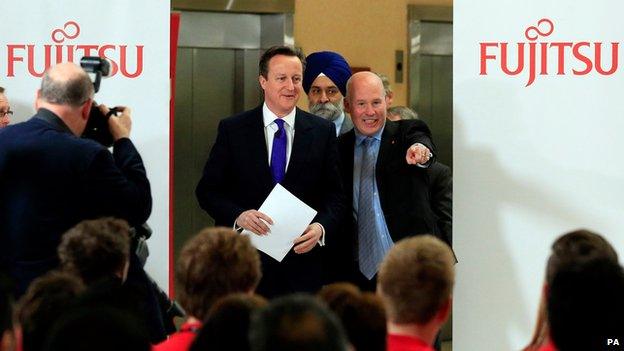
David Cameron announced a "jobs miracle" in his speech at Fujitsu
Last Friday, surrounded by Fujitsu workers in Solihull, David Cameron's voice was impassioned as if finally he had a piece of news that could not be challenged and would shake up the campaign.
"We are," he said, "the jobs factory of Europe."
More jobs, he went on, had been created in the UK than in all the other 27 EU countries put together.
Then he paused, stared at the speech prompt at the back of the room and declared: "We are living through a jobs miracle."
Politicians claim many things, but the announcing of a miracle is rare.
To underline this success, we were handed briefing notes that stressed that these were not part-time jobs; that the North was growing faster than the South; that the majority of these jobs were going to Brits and not foreign nationals.
So I asked the prime minister whether in the light of all this record-breaking, "does it puzzle you why you are not further ahead in the polls?".
His reply did not address the polls, but amongst senior Tory officials there is a growing sense of exasperation that the voters don't seem to get it, don't seem to recognise their achievements.
Tory team puzzled
There is a fear of the "1945 factor" - where after a hard-earned victory, the voters vote for change.
The Tory team seems equally puzzled that the voters don't "see through" Ed Miliband.
After the launch of Labour's manifesto - with its claims to be the party of fiscal responsibility - Mr Cameron shook his head.
"It's too late, too late," he said.
He believed that for such a narrative to take root it needed years, not weeks. The Tory team was scathing about the manifesto of their main opponents.
"There's not a single new policy," said one senior official, "Niente."
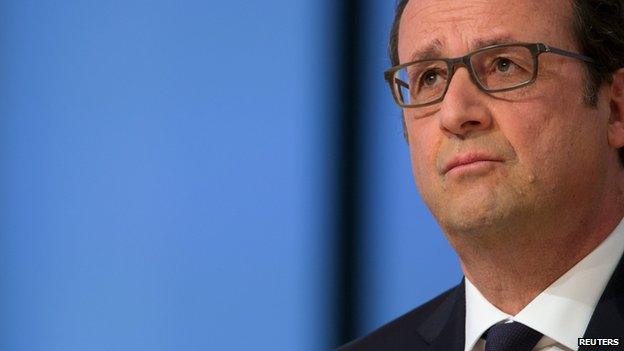
'Monsieur Normal' went on to win his 2012 campaign
Even so, they had planned a campaign where they would make the character and competence of the Labour leader an election issue.
It reminded me of Nicolas Sarkozy's assessment of Francois Hollande during the election campaign of 2012.
"Hollande is useless," he said.
His supporters called Hollande "Flanby" - a brand of wobbly caramel pudding. But "Monsieur Normal", as the underdog called himself, went on to win.
'Tough fight'
The Tories insist they have not under-estimated Mr Miliband; they privately concede that the Labour leader has performed well at the debates. He has shed some of his awkwardness.
Mr Cameron will not talk directly about his opponent's campaigning style beyond saying, "look, we're in a tough fight".
Much as the Tories believe that Labour has left it too late to claim the mantle of economic responsibility, so the Conservatives continue to suffer from a narrative laid down by Labour long ago; that they are the party of privilege, of the few.
It is the underlying message behind most of Labour's responses to Tory announcements.
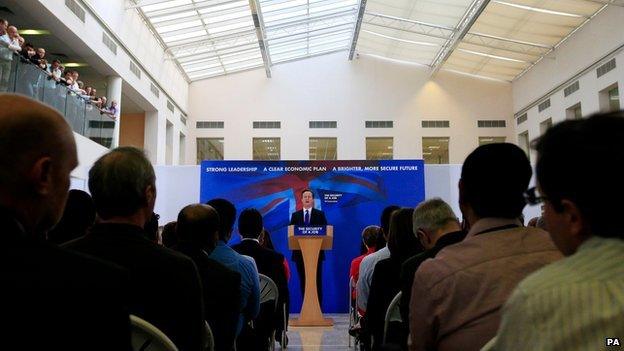
Cameron, here in Solihull, "thrives at question and answer sessions he holds in the offices of big companies"
So when the Conservatives unveiled a new policy on inheritance tax, one shadow minister said "at a time when our NHS is in crisis and most working people are paying more under the Tories, it cannot be a priority to spend £1 billion on a policy...." that only applies to 10% of houses.
Nothing angers Mr Cameron more than being accused of being the candidate of the rich, but he has not been able to lay the accusation to rest.
"Labour hurt the low paid," he says with passion. "We created two million more jobs… a job is the best way out of poverty."
'Outwardly confident'
So the emphasis at every campaign stop is on "working people". At his manifesto launch he used the phrase 11 times.
He is outwardly confident. He thrives at question and answer sessions he holds in the offices of big companies.
His confidence is built on a simple strategy. The Tories, he says, will take back many seats from the Lib Dems.
Secondly, he believes the UKIP vote is soft and that in the final days of the campaign their support will weaken further.
Thirdly, in his view, Labour will nearly be wiped out in Scotland. If those predictions turn out to be true, then they only have to win 23 marginal seats to form a majority government.
That is the mantra and it is repeated endlessly, even though most analysts believe some kind of coalition is all but inevitable.
'Jitters in party'
But, according to that strategy, they believe they don't have to set the campaign on fire and they don't have to take risks. They stick to their central claim that they have delivered economic recovery and voting Labour puts it all at risk.
Central to this plan is to point up in every speech the dangers of a Labour government propped up by the SNP - a party that wants to break up the UK.
But with two-and-a-half weeks to go to the election, there are some jitters in the party.
They believe the strategy is too defensive. They warn that Labour might build not just a lead but some momentum too.
They are concerned too that the Tory party is weak in the country, with too many members over 75 and therefore less active on the doorsteps.
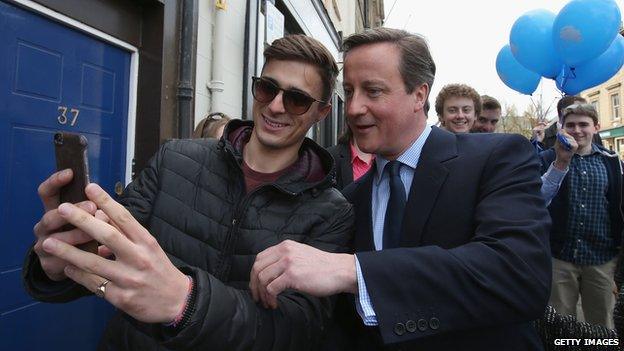
The prime minister took part in a walkabout in Alnwick last week
The jittery want Mr Cameron to take some risks, to barnstorm, to take on his critics, to drive the campaign in the country, to show some passion and energy.
Mr Cameron is not alone in being cautious about the random encounter. Only this week a reporter challenged Mr Miliband over what he called "stage-managed" nature of the campaign.
So far Mr Cameron has only done one walkabout and that was on the manicured streets of Alnwick in Northumberland. (He did visit a Sikh and Christian festival this weekend).
As I have pointed out before, elsewhere in Europe party leaders engage much more freely with the voters and the cameras do not turn towards every heckler.
In the UK the political nervousness of the unscripted moment is partly due to the media.
During the brief walk in Alnwick, a man pulled out a ukulele and sang "go back to Eton", only using more colourful language. One of my television colleagues rather despairingly said that despite its total lack of significance, he had faced repeated demands to include it in his report.
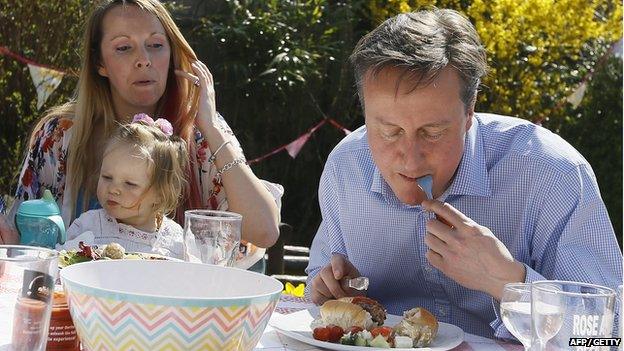
Mr Cameron's table manners led to a "lengthy debate"
When Mr Cameron stopped at a BBQ and ate a hot dog with a knife and fork there was a lengthy debate among the travelling reporters as to whether this was some kind of gaffe.
The campaign teams know that many of the reporters are on gaffe patrol. Indeed, programmes send out emails specifically looking for unscripted moments.
So, as the critic said, campaigns can appear stage-managed, timid and risk averse.
On the TV news, aside from the studio debates, there is little sense of a national drama unfolding on the streets of our towns and cities. Too often the campaign is reported as if it is an extension of the culture of Westminster.
'Show soul'
So Mr Cameron and his team face a dilemma - to continue with a strategy of standing on their economic record, or to break out, to risk the unscripted encounter, to accept that the TV teams are waiting for a stumble and to change the dynamics of the campaign.
The Tories have played some of their major cards - inheritance tax, extending free childcare, no income tax for minimum wage earners, extending right-to-buy - but the polls have hardly shifted.
It is clear many voters do not yet feel the benefit of a recovery and are wary of spending cuts to come.
This week the Tories will unleash Boris Johnson. That should deliver some energy.
Cameron himself seems at ease. He does not betray some of the anxieties of his staff.
Sometimes on flights he puts on his large red headphones and tunes out.
Apparently one of his favourite songs is All These Things That I've Done, by The Killers, which contains the line: "I got soul but I'm not a soldier".
Some Tories are urging him to show soul - and to fight.
- Published17 April 2015
- Published14 April 2015
